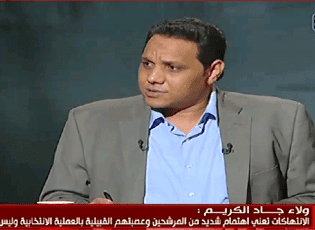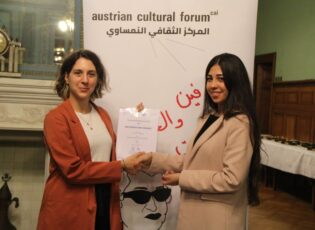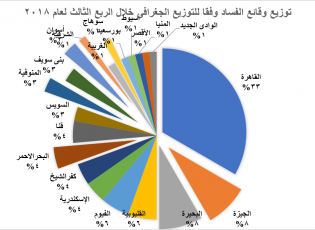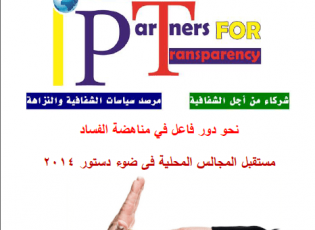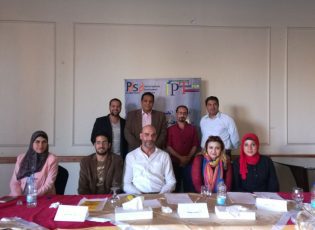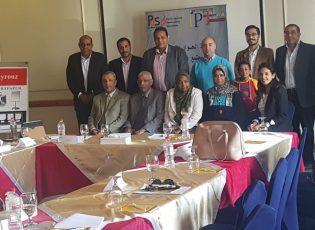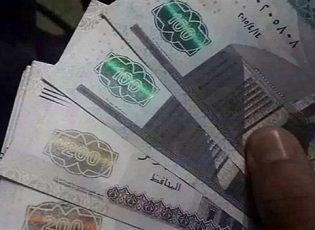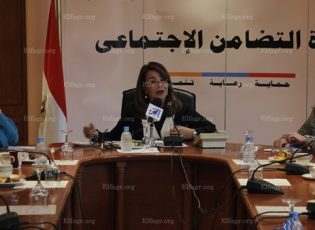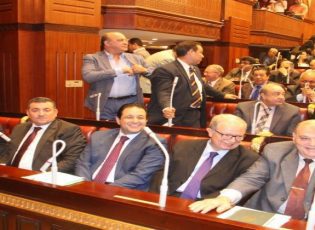The Middle East: 12/17/2016 - 4:18:10
Books - Zaki knew him
The Partners for Transparency Foundation held a high-level expert meeting with the participation of a distinguished elite of parliament members from one side and leaders of civil society organizations concerned with the issue of combating corruption on the other hand. An objective and constructive dialogue was conducted between the two parties on the legislative requirements and arranging the priority of the laws required to be implemented to strengthen Efforts to prevent and curb corruption.
MP Magdy Malak, head of the fact-finding committee for corruption in wheat supplies, participated in the table MP Muhammad Abdullah Zain, the author of the proposed law to establish the National Anti-Corruption Commission, Representative Manal Maher Gemayel, a member of the Parliament's Human Rights Committee, as well as from civil society organizations, Professors Yasser Abdel-Gawad, Director The Arab Law Office, Shehata Muhammad Shehata, Director of the Arab Center for Integrity, Saeed Abdel-Hafez, President of the Dialogue Forum Foundation, Hani Ibrahim, President of the Mashreq Foundation for Development and Population, Ayman Aqeel, President of the Maat Foundation for Peace, Development and Human Rights, Abdel Nasser Kandil, Parliamentary Analyst, Hussein Metwally, a journalist specialized in Corruption cases.
The meeting discussed ideas and visions related to the package of legislation to be completed, and the attempt to prioritize these legislations, as well as the role assigned to each party in the process of harmonizing anti-corruption legislation and enhancing transparency with the requirements of implementing Egypt's 2030 sustainable development strategy.
Dr. Walaa Jad Al-Karim, Director General of Partners for Transparency, said at the beginning of the meeting that the meeting is gaining increasing importance in light of the continuous demands of civil society organizations for the necessity to develop the legal and institutional environment to combat corruption and achieve the goals of the Egypt 2030 strategy, and to support the efforts already made by some monitoring institutions. Parliamentary mechanisms, as well as translating the political discourse that focuses on combating corruption into specific procedures and practices based on a set of deterrent and adequate laws. However, the parliamentary agenda is burdened with a huge set of legislation that is required to fulfill the constitutional entitlements and urgent developmental needs, thus providing a continuous and effective dialogue platform Between civil society and parliament could lead to pushing for anti-corruption legislation to be a priority in setting the parliamentary agenda during the next stage.
For their part, the deputies expressed the importance of the meeting because it provides an opportunity to communicate directly with representatives of civil society organizations that have long experience in legislative reform issues to combat corruption, and they agreed that there is already a big crisis in the current legislation, and this legislation may be the main cause of corruption. The rates of development and the complexity of the investment environment decreased, indicating that the laws on information circulation and the protection of whistleblowers and witnesses may be discussed soon, while there are proposals for laws to establish a national anti-corruption body that will be discussed in the proposals and complaints committee.
Civil society representatives stressed the importance of bridging the current legislative void by expediting the adoption of the two laws on information circulation and the protection of whistleblowers and witnesses, and at the same time making radical amendments to the articles of the penal code related to waste of public money and bribery, and considered these amendments a legislative priority for any serious efforts in anti-Corruption .
Representatives of parliament and the leaders of civil work participating have confirmed the request of the Partners for Transparency Foundation to organize another series of dialogue sessions between members of Parliament and civil society within the framework of the same issue, and the deputies declared their full welcome for any legislative proposals that will be presented through civil society organizations.
MP Magdy Malak, head of the fact-finding committee for corruption in wheat supplies, participated in the table MP Muhammad Abdullah Zain, the author of the proposed law to establish the National Anti-Corruption Commission, Representative Manal Maher Gemayel, a member of the Parliament's Human Rights Committee, as well as from civil society organizations, Professors Yasser Abdel-Gawad, Director The Arab Law Office, Shehata Muhammad Shehata, Director of the Arab Center for Integrity, Saeed Abdel-Hafez, President of the Dialogue Forum Foundation, Hani Ibrahim, President of the Mashreq Foundation for Development and Population, Ayman Aqeel, President of the Maat Foundation for Peace, Development and Human Rights, Abdel Nasser Kandil, Parliamentary Analyst, Hussein Metwally, a journalist specialized in Corruption cases.
The meeting discussed ideas and visions related to the package of legislation to be completed, and the attempt to prioritize these legislations, as well as the role assigned to each party in the process of harmonizing anti-corruption legislation and enhancing transparency with the requirements of implementing Egypt's 2030 sustainable development strategy.
Dr. Walaa Jad Al-Karim, Director General of Partners for Transparency, said at the beginning of the meeting that the meeting is gaining increasing importance in light of the continuous demands of civil society organizations for the necessity to develop the legal and institutional environment to combat corruption and achieve the goals of the Egypt 2030 strategy, and to support the efforts already made by some monitoring institutions. Parliamentary mechanisms, as well as translating the political discourse that focuses on combating corruption into specific procedures and practices based on a set of deterrent and adequate laws. However, the parliamentary agenda is burdened with a huge set of legislation that is required to fulfill the constitutional entitlements and urgent developmental needs, thus providing a continuous and effective dialogue platform Between civil society and parliament could lead to pushing for anti-corruption legislation to be a priority in setting the parliamentary agenda during the next stage.
For their part, the deputies expressed the importance of the meeting because it provides an opportunity to communicate directly with representatives of civil society organizations that have long experience in legislative reform issues to combat corruption, and they agreed that there is already a big crisis in the current legislation, and this legislation may be the main cause of corruption. The rates of development and the complexity of the investment environment decreased, indicating that the laws on information circulation and the protection of whistleblowers and witnesses may be discussed soon, while there are proposals for laws to establish a national anti-corruption body that will be discussed in the proposals and complaints committee.
Civil society representatives stressed the importance of bridging the current legislative void by expediting the adoption of the two laws on information circulation and the protection of whistleblowers and witnesses, and at the same time making radical amendments to the articles of the penal code related to waste of public money and bribery, and considered these amendments a legislative priority for any serious efforts in anti-Corruption .
Representatives of parliament and the leaders of civil work participating have confirmed the request of the Partners for Transparency Foundation to organize another series of dialogue sessions between members of Parliament and civil society within the framework of the same issue, and the deputies declared their full welcome for any legislative proposals that will be presented through civil society organizations.
Short link: https://pfort.org/en/?p=1935


